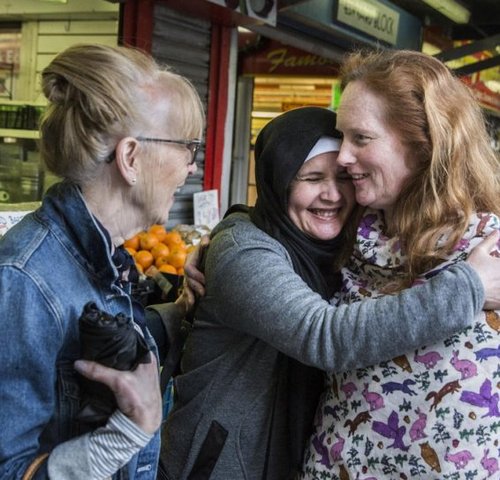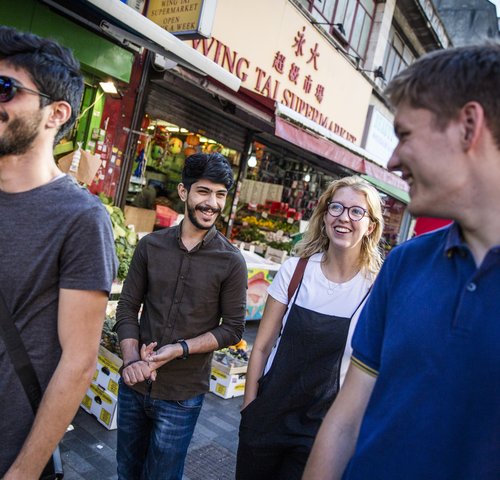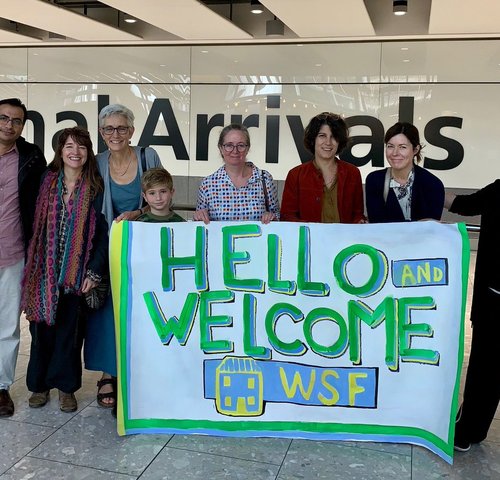What Integration Means Under Resettlement
What Integration Means Under Resettlement
In the small circle of civic society that is community sponsorship groups, there is a list of common denominators, of obstacles to be fought and wins to be celebrated. They include the forming of groups, the raising of funds, sending applications, securing housing, navigating benefits and a range of other tasks that are slowly but steadily being ticked off.
But in the months that follow the grand day of arrival at the airport where group efforts culminate, emotions peak and life seems to come together, reality knocks gently but firmly on the door and asks to be dealt with.
What presents itself on the other side is often much less tangible and more complex than the somewhat stringent steps required to obtain the Home Office’s approval and ultimately getting the family on the plane.
We enter a minefield of past trauma and mental health issues, perhaps of a husband whose role as sole provider for his family is under threat and a wife who feels ambivalent about work, and in turn may jeopardise the good relations with the local job centre. Finally, we throw these emotions into a pool of cultural and social practices the family must adopt but which may in some ways conflict with their own worldview.
All volunteers experience different manifestations of cultural hiccups causing slight embarrassment, anger or hopefully a laugh. Luckily, many see commendable efforts and rockhard determination to master the grammar of this odd foreign language or navigate the town centre alone. A few groups, however, witness hopelessness and despair that are visible threats to the family’s integration. Irrespective of language proficiency and cultural finesse, integration should be a top priority because successful sponsorship hinges entirely upon it.
Who Does Culture Belong To?
First and foremost, we must ponder on the concept of culture, how it takes not the form of a static entity belonging to someone but constitutes a dynamic process, something we as humans do and perform. In many ways, culture is second nature, behaviours and norms that we take for granted. Constantly challenged by changing socioeconomic circumstances, political climates and cultural streams - accelerated by globalisation - culture reflects evolving structures, habits, norms and power dynamics. This in turn makes them open to discussion meaning they evolve and so do people’s perceptions of and roles in them.
Defining culture in more fluid terms increases the opportunities for and paths to integration. For many, cultural identity is the elaborate patchwork pieces that take months to create. As humans, we are able to host numerous habits of coexisting cultural frameworks meaning we can have a penchant for Egyptian soaps while also enjoying a cuppa.
Integration
For these habits to take root, we as community sponsorship groups must foster a sense of belonging, the feeling that one is not foreign, different or oddly incompatible with the local culture. In that respect, social capital (contacts, networks, friends) work like magic. Joining a faith-based institution or a local group whether they gather around bingo, knitting, child-rearing or cooking provides that sense of purpose and affiliation, of “I need to go somewhere”.
For refugees in particular, it may be worth exploring groups built up around shared experience. Perhaps there are other Syrians in the neighbourhood?
Syncing more closely with the Home Office’s requirements, a key aspect - perhaps the key aspect - of integration is employment.
“ Employment is the most important factor in securing the integration of migrants into society as it enables interactions, increases opportunities for learning local language and it provides the opportunity to build a future and to regain confidence (Phillimore, & Goodson, 2006). Refugees who are working adjust more easily to the host society than those who are unemployed. ”
Rather than employment in and of itself, work encompasses all the central components of integration. As much as language skills are a prerequisite for employment, work colleagues will invariably teach colloquial language. Employment also develops skills, confidence and ultimately, the sense of purpose we all require for fulfillment, to feel complete as human beings.
By definition, volunteering offers another gateway to cultural learning and social connection. Beyond the real possibility of a potential job, volunteering provides skills, purpose and perhaps even the soul searching leading us onto the path we were destined to follow.
Inseparably, language always features in the top 3 priorities. Unable to piece together sentences, we are even robbed of the opportunity to watch TV. As a result, we experience layered feelings of isolation and the more barriers we face in our communication with the outside world, the less inclined we feel to pursue it afresh. Unsurprisingly, ESOL classes are mandatory under the community sponsorship scheme. Beyond the compulsory 8 hours, groups have every interest in encouraging considerably more classes of various types to diversify vocabulary and hopefully discern the person’s preferred method of learning.
For children’s successful integration, the school plays a key role for all the same reasons that employment is so vital. For most of us, school is where we develop our deepest bonds and nurture our most precious friendships. Often, it’s where we come to understand who we are.
To adequately help a family integrate in British society, it is our duty - and hopefully our instinct - to see the family as equals. To remember that “refugee” is a status, not a person. From this we ought also to learn that integration is not an activity for the family to complete but a dynamic process that lies in the interactions between them and British society at large.
“Considered to be the best approach, integration is considered a two-way process and can only be successfully pursued by migrants when the host society is open and inclusive in its orientation towards cultural diversity.”
As we build up life for the newcomers, the project operates under the banner of integration, not assimilation. Shedding the hijab or changing family dynamics do by no means belong on our agenda. Instead, we offer the social techniques that allow our friends to interact respectfully with their fellow citizens and encourage these interactions to occur as frequently as humanly possible. While it may be common sense to a Brit, it is worth mentioning that when people ask how you are doing, they don’t expect an answer. In fact, providing one may make the situation painfully awkward.
To complicate matters, the integration equation includes the variable of personality. Life experiences, mental make-up and energy levels all sneak into the design of that person’s integration plan.
Before we embark on the sponsorship journey, there are questions to consider: Who does the integrating? When does someone stop being a refugee? Are there things in British society that may aid or hamper the process of integration?
As we trudge towards the 24th month of community sponsorship where the end of formal support meets the beginning of independent citizenship, our success is largely mirrored in the fluency, thriving and social solace of the family. Just as housing and benefits erect the structures that cover basic needs, integration is what breathes life into resettlement.
Online Courses
Working Supportively with refugees: Principles, Skills and Perspectives
Caring for Children Moving Alone: Unaccompanied and Separated Children
Volunteering with refugees (start date not released yet)
Migrants and refugees in education: a toolkit for teachers
Human Rights: The Rights of Refugees
Refugees in the 21st Century
Reading list
Home Office - Integrating Refugees - link
UN - The Integration of Refugees, A Discussion Paper - link
UN - Refugees and Social Integration in Europe - link


